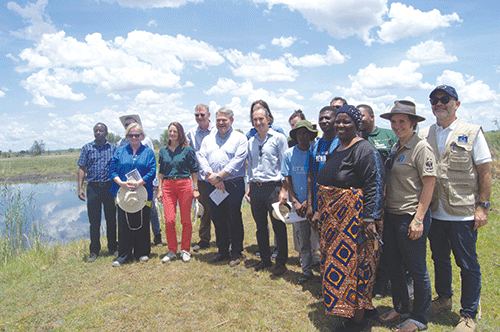MAYUNI - The Zambezi community in collaboration with the Namibia Nature Foundation (NNF) and the fisheries ministry continues fighting to ensure the sustainability of protected fisheries areas to save those species threatened by over-harvesting.
One such species that is nearly extinct is the African pie along the Kwando River within the Mayuni conservancy’s main water channel.
Along the Kwando, there are three fish reserves within conservancies.
Two of the reserves are in the Balyerwa conservancy, and one in Mayuni.
The Mayuni conservancy was gazetted in 2020 for the community to preserve their fish resources.
A European Union delegation recently visited this fish reserve to assess progress.
These fish sanctuaries are identified by local communities, and harvesting restrictions are put in place to protect the fish.
NNF project coordinator Thomas Neema told New Era that during a survey conducted by the University of Namibia they found that fish species were declining.
Based on that, together with the community, government came up with the protected fish reserves. There are fish guards to ensure fish resources are protected and no illegal fishing activities take place.
Neema noted that the rules within fish reserves are enforced by community fish guards, who are equipped to patrol these protected areas. Some fish reserves accumulate water from the spill-overs of annual flooding.
There are also fish monitors who collect data on the fish reserves.
“We use the annual data collection to see whether there is any improvement in this channel. We have seen that the African pie - which was seen as extinct in this area - is now back in abundance.
So, we give credit to the fish guards who are constantly doing patrols to ensure there are no illegal fishing activities in the channel,” he added.
One of the fish guards at the Mayuni conservancy, Mani Ville Mutoloki, said they patrol the channel to prevent illegal fishing.
One challenge they face is the water level getting shallow, and the fish then going back into the main channel.
“The fish has gone back into the mainstream. Maybe during the rainy season, the fish might come back. Our people used to fish in the main channel where the fish spill, as agreed with the traditional authorities,” he said.
The fishing season closes on 1 December and opens on 1 March every year to allow fish stocks a chance to recover, and for breeding to occur.
Mutoloki added that as fish and game guards, they control and patrol the whole channel. If anyone is found with fish during the closed season, they are fined by the traditional authority within that conservancy.
“We have been operating for three years. We patrol the channel twice a week. We have a campsite here to check the fish poachers who come at night. We ensure no one comes and catches fish here illegally. We take him to the traditional authority for punishment. If we get someone poaching wildlife, we call in officials from the environment ministry,” he added.
Neema said once fish stock is confiscated, such resources are shared within communities in the conversancy.
Equally, he gave the assurance that the protected areas have boats and other necessities to ensure efficient patrols of the channels by fish guards.
However, the conversancy is challenged by the human-wildlife conflict, especially elephants destroying villagers’ crop fields and water infrastructure.
Farmers are also losing livestock due to crocodile attacks along the Kwando River.
Last week, a farmer lost a cow after it was attacked by a crocodile in the Mayuni conservancy.
- anakale@nepc.com.na


